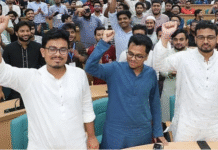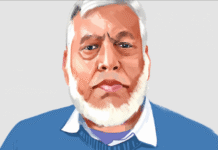Rasheda K Choudhury,Executive Director, Campaign for Popular Education (CAMPE) and Vice-President, Global Campaign for Education (GCE), talks toEresh Omar Jamal of The Daily Star about the fundamental deficits in our education system.

Rasheda K Choudhury
What are some fundamental successes in our education sector in recent years?
One major success has been the achievement of the goal of universal enrolment at the primary level. A significant decrease in school dropout rate from 40 percent 10 years ago to 18 percent today is another milestone. Although this has been a great achievement, it has remained stagnant there for some time now, which is worrying. Another success has been the general increase in demand for education among people. If you ask children today, all of them would tell you that they would like to learn and go to school. Adults too will say that they would like to send their children to school to get educated. This means that a huge demand for education has been created and established firmly here in our country; whereas in many countries like India, people often say, “What is the point of an education?” or “Why educate?” It is the supply side that has become a challenge for us.
What are the fundamental challenges to improving our education system?
We have done well to ensure people have access to education. But we have not yet managed to provide quality education for all segments of the population. Providing quality education is without a doubt the biggest challenge.
The immense quality divide that exists between different types of educational institutions is a part of that concern. Education has become more or less a commodity. Nowadays, “if you pay more, you get more.” Some parents are literally selling their properties to educate their children. But how many can afford to do that? We see lack of equity when it comes to opportunity. And this is most severe usually in the case of mainstream primary schools, particularly in urban slums and hard-to-reach areas. Except for the so-called “good” primary schools, most of the others are not equipped for providing quality education and there are some schools where the number of students is low. This is creating a disparity. Quality divide between the three main streams of education (madrasa, English and Bangla mediums) in our country too has become wider. Many of us often question the culture and practice of English-medium schools but it can’t be denied that they provide an education comparable to international standards. What about the others?
What according to you are some of the main factors behind our failure to provide quality education?
There are three main weaknesses that are common to many of our educational institutions. First is the quality of teachers. Thousands of teachers are recruited every year and sent straight to classrooms without any training. This doesn’t happen in most other countries. Some government school teachers teach just to get a posting in Dhaka. Although private schools may not always be good, they are usually better in countries that have excellent government schools. That is not at all unexpected as high-quality education in government schools generates healthy competition and automatically ensures the same in other institutions and vice versa.
Second is governance in institutions. Not so much at the primary level, but definitely at the secondary and higher levels. School Managing Committees are increasingly being taken over by the business class and by political interests. This is actually one of the reasons why many teachers are recruited to serve vested interest groups. Even after becoming a decision-maker of educational institutions, very few among the political class are ever interested in improving the quality of education. Except for some, most of them are often there for selfish motives and material benefits.
Third is infrastructure. Every year there are thousands of requests for schools to get repaired. Many of these are often ignored. Ministers and politicians come out from time to time and blame it on corruption, which is true to a large extent. Huge chunks of allocated funds are continually wasted because of lack of transparency. Children are even compelled to learn under trees and still nothing is done! Yes, local-level officers do complain. But who will fix it? This too is tied to the previous problem; as you can see everything is connected and their combined impact on the quality of education has ultimately been negative.
How would you suggest the quality of education be improved?
We must have examination reforms; why are students in Bangla medium being made to sit for four national/public examinations before entering higher education institutions? Because of the pressure of competing in all those completion exams, schools are often bypassing regular classroom-based assessments and focusing more on preparing students by any means, be it private coaching or using guidebooks. We need to get rid of coaching centres and the dependence on guidebooks rather than textbooks which again raises the urgency and adequacy of teacher preparedness and training.
The reason students refer to guidebooks is because their teachers are often not good enough to form the bridges between materials covered in their textbooks that are necessary for them to have a clear understanding of what they are learning. One reason why this has been happening is because teacher-guides are often supplied later and teachers lose interest in using them.
Behind this whole debate around giving free textbooks is the fact that this has become an issue of complacency. While the government is quite complacent about giving free textbooks, the education administration does not often bother about teacher-guides which are very important, being the main point of reference for sequential instruction.
At the primary level, one big challenge is having the right teacher-student ratio. Experts say that this ratio should be 1:35, but our average is 1:60. This creates huge challenges for teachers in terms of giving students enough attention and guidance.
Another direction that we should be considering would be to decentralise our highly centralised education system. Right now, everything in regard to the sector is centrally handled. There are local education boards throughout the world to handle relevant matters concerning their localities and yet, here they don’t exist. When there is so much discrepancy and inequity in our system, the need for establishing local education boards cannot be stressed enough.
Our National Education Policy (NEP) 2010, the first one to be adopted by the Parliament since the liberation of Bangladesh, has provided pragmatic guidance and forward-looking recommendations like extending primary education to Grade VIII, creation of a Permanent Education Commission, introduction of only two public examinations (one at the end of Grade VIII and another at the end of Grade XII) and decentralisation of the education system. Unfortunately, we have not yet come up with a roadmap for implementation of this policy.
And lastly, we must be willing to invest more in education as currently, ours is the lowest in South Asia—30 to 35 percent of all students in our primary schools are first-generation learners, who receive very little support from their families and have to depend wholly on their schools. If we do not invest more and improve the system significantly, these students and others in the future may not be interested to participate in the education system altogether. All our achievements like universal access to primary education, gender parity at the primary and secondary levels, ICT-based classroom practices, recognition and practice of teaching-learning in five ethnic languages, introduction of Braille system, etc., may get jeopardised. If we truly want to ensure “quality education for all,” then we need to have stronger political commitment, appropriate strategies to implement the NEP 2010, combined with adequate resource allocation and its judicious, transparent utilisation.









